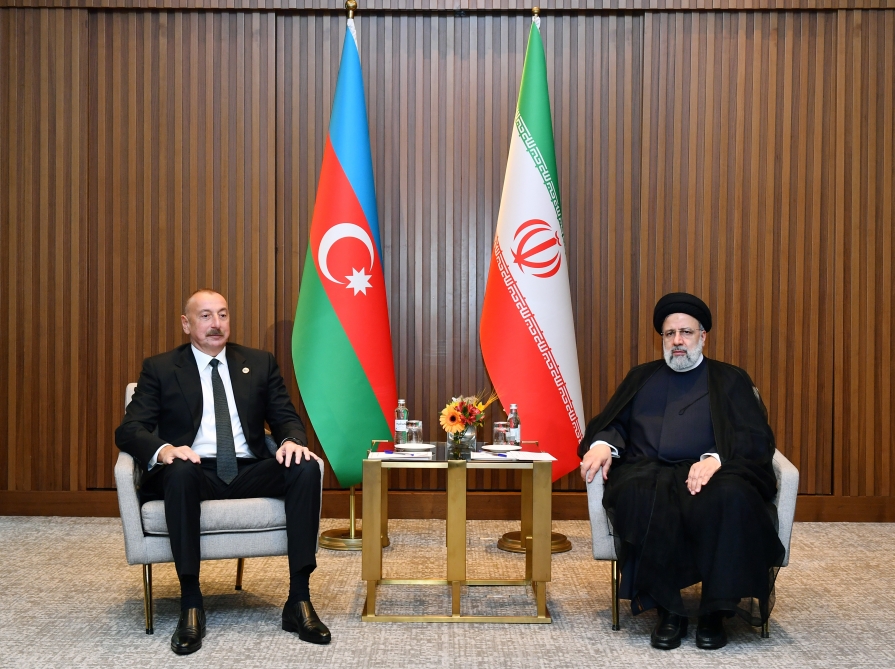Iranian President Ebrahim Raisi has said that the territorial integrity of Azerbaijan and Armenia should be respected, and expressed his country’s readiness to help resolve the discords between the neighboring countries.
In a meeting with Azerbaijani President Ilham Aliyev on the sidelines of the 6th Summit of the Conference on Interaction and Confidence-Building Measures in Asia (CICA) in the Kazakh capital Astana on 13 October, the Iranian president said that Tehran was the first country to welcome the liberation of Azerbaijan's Karabakh region from the Armenian occupation in the 44-war in 2020.
"Iran is ready to use its great capacity to resolve the discords between Azerbaijan and Armenia," Raisi was quoted by his official website as saying, adding that the national sovereignty and territorial integrity of the Republic of Azerbaijan and Armenia should be respected.
"From the point of view of Iran, any change in the historical and geopolitical borders of the region and any change in the transit status of Iran and Armenia are rejected," Raisi said.
The Iranian president also called Azerbaijan “a very important partner” for his country among the neighbors of the Islamic Republic, and noted that Tehran intends to develop cooperation with Azerbaijan.
In his turn, President Aliyev hailed the development of relations among Caspian littoral states on the basis of friendship, saying that Azerbaijan was continuing efforts to ensure peace and security in the Caspian Sea and the South Caucasus region.
Emphasizing that Azerbaijan was pursuing an independent foreign policy, President Aliyev drew attention to the fact that Armenia committed provocations on the border areas on September 12-13, a move that escalated tensions in the region, the Azerbaijani state-run agency Azertag reports.
Speaking about peace-building processes in the South Caucasus, President Aliyev also said that Azerbaijan had proposed to sign a peace treaty with Armenia based on five principles.
Azerbaijan and Armenia have recently recognised each other’s territorial integrity and sovereignty. The agreement was reached following a quadrilateral meeting between President Ilham Aliyev, Armenia’s Prime Minister Nikol Pashinyan, France’s President Emmanuel Macron and European Council President Charles Michel in Prague on October 6, on the sidelines of the first gathering of the European Political Community.
“Armenia and Azerbaïdjan confirmed their commitment to the Charter of the United Nations and the Alma Ata 1991 Declaration through which both recognize each other’s territorial integrity and sovereignty. They confirmed it would be a basis for the work of the border delimitation commissions and that the next meeting of the border commissions would take place in Brussels by the end of October,” the Statement reads.
Armenia agreed to facilitate a civilian European Union mission alongside the border with Azerbaijan based on the outcomes of the Prague meeting. Azerbaijan agreed to cooperate with the civilian EU mission as far as it is concerned. The aim of the mission is to build confidence and contribute to the border commissions with its reports. The advance team of EU observers arrived in Yerevan on October 14.
Meanwhile, the Iranian president rejected “any European military presence under any guise” in the region, according to Mohammad Jamshidi, Deputy Chief of Staff for Political Affairs to the Iranian’s President's Office.
Iranian ex-ambassador to Azerbaijan Mohsen Pakayin also criticized the mission saying that the participation of the countries that do not represent the South Caucasus in the region to some extent, including the US and the EU, will pose a serious threat to peace and security in the region.
“Bilateral resolution of problems between Azerbaijan and Armenia without the intervention of countries outside the region will benefit peace and security,” Pakayin said, and called on the two states to solve problems between themselves within the framework of the trilateral statement mediated by Moscow in November 2020, and the principle of territorial integrity.
Based on the trilateral statement signed by Armenia, Azerbaijan and Russia in November 2020, Azerbaijan has pushed for the development of the Zangezur Corridor project, which would link mainland Azerbaijan to its autonomous exclave of Nakhchivan. Iran has concerns that the corridor may cut off its land route to Armenia. In the meantime, the Islamic Revolution Guards Corps' ground force is preparing to hold a "large-scale exercise" in the coming days in the north-western areas of the country bordering Azerbaijan.
On October 11, referring to the EU's sending the civilian mission, Russian Foreign Ministry spokeswoman Maria Zakharova accused France of trying to "drive a wedge" between Russia's relations with Armenia and Azerbaijan, saying that the EU tried "to intervene by any means in the settlement of relations between Azerbaijan and Armenia and to edge out our country's mediation efforts".
Addressing a trilateral meeting in Astana on the sidelines of the CIS summit, Russian Foreign Minister Sergey Lavrov said on October 14 that he expected to discuss with his counterparts from Armenia and Azerbaijan the implementation of agreements reached by the presidents of the three countries in November 2020 and January 2021 so that to understand better "how to proceed."







 Armenian sappers commenced on Monday mine-clearance operations in the territories adjacent to the Saint Mary Church in village of Voskepar (Armenia...
Armenian sappers commenced on Monday mine-clearance operations in the territories adjacent to the Saint Mary Church in village of Voskepar (Armenia...
 Iran and Pakistan have signed eight cooperation documents in various fields, and agreed to strengthen ties to fight terrorism in the region.
Iran and Pakistan have signed eight cooperation documents in various fields, and agreed to strengthen ties to fight terrorism in the region.
 As the conflict between Ukraine and Russia escalates, the strategic importance of Kharkiv, Ukraine's second-largest city, has come sharply into focus.
As the conflict between Ukraine and Russia escalates, the strategic importance of Kharkiv, Ukraine's second-largest city, has come sharply into focus.
 President Aliyev emphasized the critical role of the North-South Transport Corridor in fostering transport cooperation between Azerbaijan and Russi...
President Aliyev emphasized the critical role of the North-South Transport Corridor in fostering transport cooperation between Azerbaijan and Russi...



